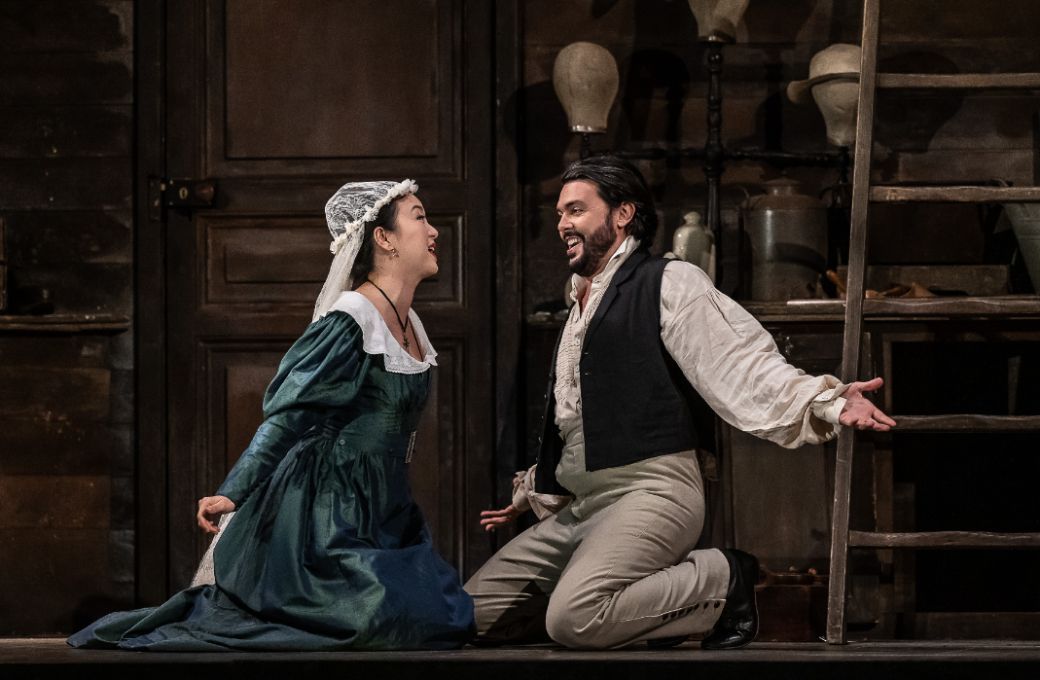The merits of Sir David McVicar’s Royal Opera House staging of The Marriage of Figaro have been well rehearsed since its 2006 premiere. Right from Leah Hausman’s meticulously choreographed overture, the viewer is thrust into a world of aristocratic and below-stairs intrigue: bustling servants flirting on the sly; joshing the bridegroom, Figaro; earwigging at keyholes. Gorgeously lit by Paule Constable, Mozart and Da Ponte’s folle journée unfolds at a dizzying pace. Now on its eleventh revival, it’s done the house sterling service. If, as has been rumoured, this proves to be its final outing, I shall lament its loss.
Returning to direct this season opener, McVicar draws energetic performances from his cast, some of whom mug a little too earnestly, but the plot is clearly told and his pacing of the action, especially the Act 2 finale, is masterful. Most of the gags land well, particularly the delicious moment when it’s revealed that Marcellina and Bartolo are Figaro’s parents. And, for the first time I can remember in this production, the guffaws of laughter that usually greet the Count begging his wife’s forgiveness are deflected by simply not displaying a surtitle translation of “Contessa, perdono”.
Musically, it was a mixed evening, Julia Jones presiding over an orchestra that was frequently invigorating but occasionally overloud, swamping a few voices. A few early glitches in synchronisation between pit and stage were ironed out by Act 2.
Luca Micheletti was a cocky Figaro, bravely squaring up to his master, his rounded baritone having plenty of bite. Recent revivals have happily favoured Italian baritones in the role and here you could have taken dictation from the crisp delivery of the bitter aria “Aprite un po' quegli occhi” where Figaro suspects his new bride of cheating on him on their very wedding day.

Of the three house debuts, Chinese soprano Ying Fang took the laurels as Susanna, the lynchpin of the action. Her acting was wonderfully animated without overreaching into hyperactivity. Vocally, she was divine; a beautiful voice, remarkably even across its range. Her dynamic control in “Deh vieni non tardar” in Act 4, where Susanna teases Figaro who she knows is snooping on her nocturnal “assignation” with the Count, contained the loveliest singing of the evening. Impossible to resist.
Ginger Costa-Jackson’s earnest house debut as a crowd-pleasing Cherubino wasn’t entirely successful, pushing at her vocal lines forcefully, although the page’s rampaging hormones pulsed with energy. Seasoned Hungarian bass-baritone Peter Kálmán was the slightly surprising third debutant, singing a conniving Bartolo.
Huw Montague Rendall sang a testy Count Almaviva with a fine, youthful baritone, sounding a shade small for the house at times. There was plenty of venom in “Hai già vinta la causa!” and he obviously has a flair for comedy. Maria Bengtsson was a late-ish step in as the Countess, bringing calmness and dignity to the role, but her pale soprano lacked colour and neither of her arias found her sustaining vocal lines comfortably through to their end, although the recapitulation of “Dove sono” was beautifully hushed.
Rebecca Evans played up the comic aspects of Marcellina deliciously, as did Alasdair Elliott’s fastidious Don Curzio and Adrian Thompson’s hectoring Don Basilio. At opposite ends of their careers, Isabela Díaz sang a ravishing Barbarina while veteran bass Jeremy White was the crusty gardener Antonio, stealing scenes in his muddy boots since McVicar’s production was new.


